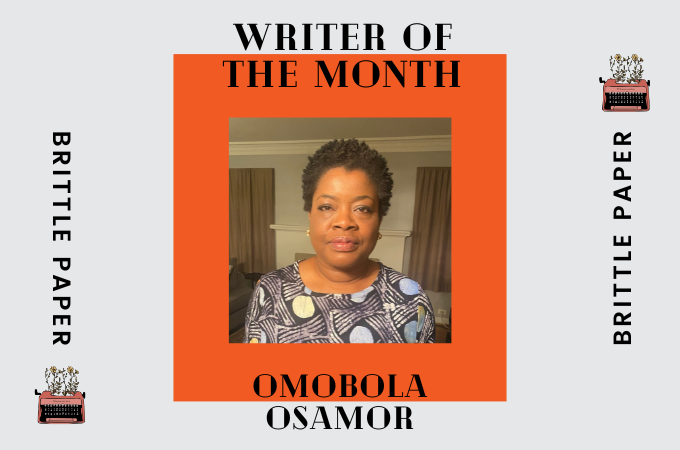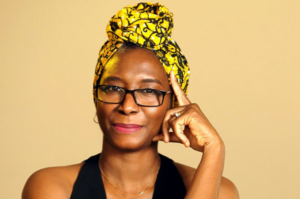
Brittle Paper’s Writer of the Month for March is Omobola Osamor!
Omobola Osamor grew up in Lagos, Nigeria. She has a postgraduate diploma in Public Administration from Galilee Management Institute, and a B.Sc and M.Sc in Microbiology from the University of Lagos, where she worked as an administrator for a decade before calling Chicago home.
A Best of the Net nominee, her works have been published by Brittle Paper, Afritondo, African Writer, Big City Lit, The Shallow Tales Review, Kalahari Review, Free Flash Fiction, and Flash Fiction Magazine and have been included in anthologies. She paused publishing on her blog to work on three manuscripts: a novel, a short story, and a poetry collection.
Let’s sit down for a chat with Omobola, our March Writer of the Month!
Brittle Paper
Omobola, congratulations on being our March Writer of the Month! Your piece “The Gardner” was my stand out story from February. But before we get more into your work, tell us more about Omobola Osamor.
I know it changes every now and then but your bio, ever since I first read it, has always stayed with me for the very simple reason that you describe your 9-5 work and creative work as, “She “sunlights” as a financial adviser, and moonlights as a writer.” I just really loved that phrasing! So, as someone who moonlights as a writer, what made you first pick up the pen?
Omobola Osamor
Thank you for the privilege to be featured on my number one platform!
My Dad is a great storyteller who encouraged reading. He travelled a lot and brought books from everywhere, opening our minds to other people’s stories. He had a personal library and built us ours. He actually discouraged our watching television, preferring we read instead. I have always had an active imagination, so reading has been the fodder my imagination fed on that brought forth my writing.
Brittle Paper
That’s really sweet and incredible that your dad built a library and encouraged reading from a young age.
I like asking a few random questions to help us get to know your literary side a bit more before we get into your writing. First up is, if anyone asked you to go off on a rant for 10 minutes about any book you have ever read, good or bad, what would you pick?
Omobola Osamor
The good! And I have several! I love Jhumpa Lahiri’s The Lowlands, Interpreter of Maladies and The Namesake; Abraham Verghese’s The Tennis Partner and Cutting for Stone; David Szalay’s Turbulence and All That Man Is. I love Odoh Diego Okenyodo’s From a Poem to its Creator, Romeo Oriogun’s Sacrament of Bodies and Warsan Shire’s Bless the Daughter Raised by a Voice in Her Head. They all focus on intra and interrelationships (individuals and systems) and explore the emotions arising from their failures and successes and the complexities of the human condition.
Brittle Paper
That’s a great list of recommendations! What is the earliest book you remember reading and loving?
Omobola Osamor
To Sir, With Love by E.R Braithwaite. I think I must have been around twelve when I read it the first time, and I remember his vivid description of the schoolyard on his first day, and I was transported within the pages. It’s a fantastic book.
Brittle Paper
Given the many writers you have already mentioned, I’m excited to ask my final question. If you could have a dinner party with your favourite artists, who would they be?
Omobola Osamor
Fela Anikulapo Kuti, the king of Afrobeat and Queen, the rock band would definitely be in attendance. But Jhumpa Lahiri, Abraham Verghese, David Szalay and Warsan Shire would be there too. I would love to discuss their creative process. All four writers actively engage the reader’s senses. Lahiri’s descriptive use of simple language is beautiful; there is so much beauty in simplicity. Verghese drops you in dazzling colour. I feel like a bystander in his book, watching things unfold. I can go on and on about Szalay’s captivating style in Turbulence, too.
Brittle Paper
Conversation, art, and music all accounted for! This would be a terrific dinner party!
Now, let’s finally talk about your writing! Usually, Omobola, I say to the Writer of the Month that we should chat about their recent work that I published. But it doesn’t feel right to only focus on February’s piece because I had the unbelievable privilege of publishing quite a few of your works since becoming Submissions Editor! I think “The Gardner” was the tenth piece if I’m not mistaken. I hope you know that I’ve come to expect at least one Omobola Osamor original in the submission inbox every month!
For readers curious to read more of your work, you also have a blog where you publish your writings. But you mentioned taking a break on there while you work on some manuscripts. Anything you can share about those upcoming projects?
Omobola Osamor
I am currently compiling a poetry manuscript and a short story collection. And presently seeking publication for a novel.
I am always happy when a piece is accepted. Rejection is part of the process; one must grow thick-skinned like a boxer, undeterred by punches. When I get a rejection, I give the piece some distance, rework and try again.
If you add my contribution to the December Festive Anthology, “The Gardner” is the eleventh piece published by Brittle Paper.
Brittle Paper
You’re right, the Festive Anthology piece (“Discarding the Old for the New”) definitely counts, so it’s eleven pieces!
Let’s start with February’s piece, “The Gardner.” I’ve published enough of your work to hopefully prove that I genuinely love your writing, all of it, but I think that “The Gardner” is my favourite. I’ve come to know your writing style and I always look forward to the rich, full descriptions you come up with, but you’ve outdone yourself with those descriptions in this piece. And you make us, the readers, get so drawn in that when the twist happens and the mood changes, you’re hit with this intense feeling of knowing ‘something has flipped’ and it’s beautifully done. One of my favourite parts is the section after the garden is ‘disrupted’:
I minded the raised voices—the arguing. I minded the tears—pellets, shattering glass. I minded holes ripped through windows as resentment grew in my search for sweet residues as hope played hide and seek. The shards and nails were everywhere, cutting and stabbing, drawers of gore, painters of blood. This stranger returned like clockwork after the melding of skins with a growing, turgid, one-sided longing, each deeper than the previous. It blotted your lenses, rendered you blind, with lips, unable to speak.
I think there’s a beauty in not overexplaining a story like “The Gardner,” but if you could describe it to someone who hasn’t read it yet, what would you say the story is about?
Omobola Osamor
Thank you, Tahzeeb. I’m delighted you love them. To answer your question, I would say it’s a supernatural fantasy about a serial killer exploring the cyclical nature of relationships. The transformative impact of his lover on himself and his twin/spirit. The beginning-infatuation, then discord-arguments and despair. The longing for a return to a peaceful past and the surreal twist when he or his spirit, depending on the reader’s interpretation, adds her to their collection.
Brittle Paper
That’s a very strong and intriguing synopsis.
When I first started working with you, a lot of the earlier publications were poems and recently there’s been some creative non-fiction and fiction stories. Is this a sign of you gradually changing your writing style or is it just that you’re writing and it happened to take on different forms? And if I can push you to play favourites, out of the eleven pieces published so far, are there any pieces that you cherish more?
Omobola Osamor
I write across several genres: poetry, non-fiction, and flash/regular fiction. I love poetry because it’s fluid and not ruled by the formatting structures of prose.
“Hair” is special because it’s a memoir and also relatable. After all, most of us, especially women, struggle with this elusive idea of beauty. I find most of us come to a quiet acceptance of who we are at the junction of when we start to really love ourselves, warts and all. I spent a good part of my growing years looking through the window of my dwelling into someone else’s yard, coveting their trees and flowers, wishing them as mine. I copied others, hoping to look like them. I didn’t study my ground until I became frustrated. Then, I started the painful journey of looking inward. “Hair” is my journey of love and self-acceptance.
Brittle Paper
That’s really beautiful, and I love the phrase you used of “I spent a good part of my growing years looking through the window of my dwelling into someone else’s yard.” It’s such an apt description of that feeling we have when we are still struggling to fully accept ourselves.
On Friday, your new work will be published. What can we look forward to on Friday? And will it be a poem or a story?
Omobola Osamor
A combination of both, Tahzeeb. It explores the domino effects of choices made in familial and intimate relationships by individuals caught in a system of injustice.
Brittle Paper
I’m sure our readers, just like me, are excited to read this piece, it sounds fascinating.
Before we go, apart from your writing, Omobola, what is one thing about yourself that you want to share with our readers? Anything.
Omobola Osamor
Self-awareness leads to growth and development, and this is something I am choosing to be intentional about. I also love plants!
Brittle Paper
Omobola, thank you for this interview and for being one of my favourite Brittle Paper contributors! I wish you all the best with those manuscripts and the book publication!
For more of Omobola’s work, be sure to check back in on Friday, and for more interviews with our writers, check out December’s with Mifa Adejumo here.








COMMENTS -
Reader Interactions